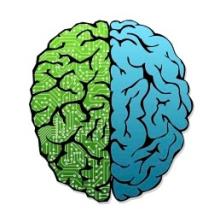
A Neuroethics Workgroup will assist the NIH BRAIN Initiative in handling issues and problems involving ethics…
In April 2013, when President Barack Obama announced the Brain Research through Advancing Innovative Neurotechnologies® (BRAIN) Initiative aimed at revolutionizing our understanding of the human brain, he highlighted the importance of addressing ethical issues that would come with it. He charged the President’s Commission for the Study of Bioethical Issues to identify a set of core ethical standards to guide neuroscience research and address some of the ethical dilemmas that might arise via the application of neuroscience research findings. The Commission held public stakeholder meetings in August 2013, December 2013, and February 2014, and issued a two-part report, Gray Matters Volumes 1 & 2, to respond to the rapidly emerging and evolving field of neuroscience.
NIH has taken a lead role in organizing the BRAIN Initiative. A high level working group of the Advisory Committee to the NIH Director sought broad input from the scientific community, patient advocates, and the general public to develop a report, BRAIN 2025: A Scientific Vision (pdf, 1.3 MB). Released in June 2014, the report articulates the scientific goals of the BRAIN Initiative along with a multi-year scientific plan for achieving these goals. The authors recognized the unique ethical questions and implications associated with neuroscience research and wrote: “Although brain research entails ethical issues that are common to other areas of biomedical science, it entails special ethical considerations as well. Because the brain gives rise to consciousness, our innermost thoughts and our most basic human needs, mechanistic studies of the brain have already resulted in new social and ethical questions.” Additionally, in November 2014, NIH held a neuroethics workshop to identify high priority areas for NIH-supported research that could inform policies pertaining to either the ethical conduct of neuroscience research or the ethical use of neuroscience research. Building on this prior work, at the July 2015 meeting of the NIH BRAIN Multi-Council Working Group (MCWG), Hank Greely, Director of the Center for Law and Biosciences at Stanford University, and Dr. Christine Grady, Chief of the Department of Bioethics at the NIH Clinical Center and a member of the President’s Bioethics Commission, presented a plan to establish a Neuroethics Workgroup of the NIH BRAIN MCWG.
The Neuroethics Workgroup received a multi-part charge from Dr. Walter Koroshetz, Director of the National Institute of Neurological Disorders and Stroke and co-lead of the NIH BRAIN Initiative:
- Recommend overall approaches for how the BRAIN Initiative should handle issues and problems involving ethics.
- Inform the MCWG and NIH on research questions important for BRAIN that could be answered through focused Notices of Funding Opportunities.
- Consider proposed funding areas for BRAIN projects for questions of ethical risk.
- Examine selected projects or applications for ethical concerns and, when appropriate, provide an ethics consultation.
- Draft relevant guidance documents to address critical ethical issues associated with BRAIN research.
In February 2016 the Neuroethics Workgroup had their first in-person meeting(pdf, 148 KB) (pdf, 138 KB) to discuss priority neuroethics issues for the workgroup to address. A summary of the meeting is available online(pdf, 445 KB) (361 KB). They identified four areas of broad ethical concern related to BRAIN research that hold the highest priority for initial consideration:
- Ethics of research with invasive technologies
- Altering, enhancing, and/or manipulating the self and agency
- Privacy/discrimination concerns, and the need for privacy protections
- Translation to contexts beyond the clinic/bench, such as commercialization, public-private partnerships, and the wider application of imaging technologies for commercial purposes.
Additionally, the workgroup identified several areas as possible suggestions for NIH-funded neuroethics research, including but not limited to:
- Predictive/diagnosis research – for example, developing best practices for managing false-positives and non-physical harms; exploring policy implications for disease prediction
- Ethics of research with invasive devices – documenting long term effects on participants; understanding obligations for upkeep of implanted neural stimulators
- Ethics of sham stimulation – how to minimize and capitalize on sham effects for invasive and non-invasive technologies
- Cybersecurity/privacy – establishing effective security and safeguards for human data and wireless transmissions to/from implanted neural devices
- Training – developing and evaluating methods of teaching neuroethics to researchers, healthcare professionals, and the public
As Hank Greely points out in his post on The Neuroethics Blog, the official blog of the American Journal of Bioethics Neuroscience, hosted by the Neuroethics Program within Emory University’s Center for Ethics, the Neuroethics Workgroup is making great progress. They are currently preparing draft documents discussing data sharing in neuroscience, and long-term obligations to human research participants with implanted neural devices. The workgroup also plans to organize several workshops on neuroethics issues relevant to the BRAIN Initiative to stimulate scholarship and identify areas that may be informed by neuroethics research or guidance documents. The first of these workshops will focus on identity, agency, and normality, and will be held in September at Columbia University (details will be posted here in the future).
